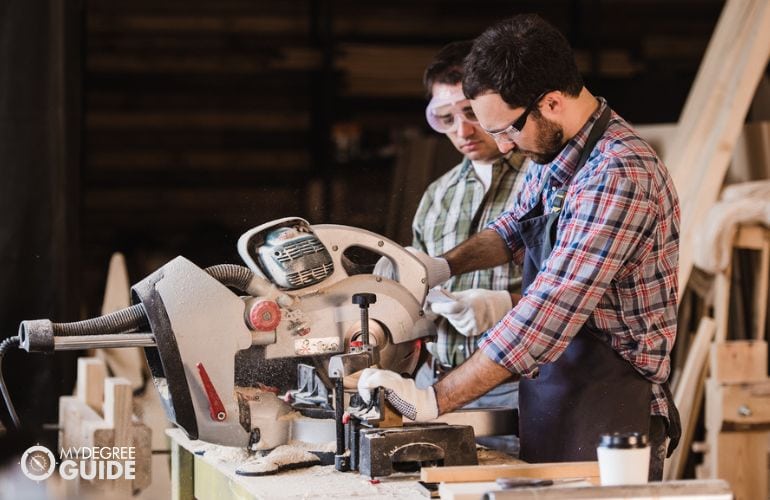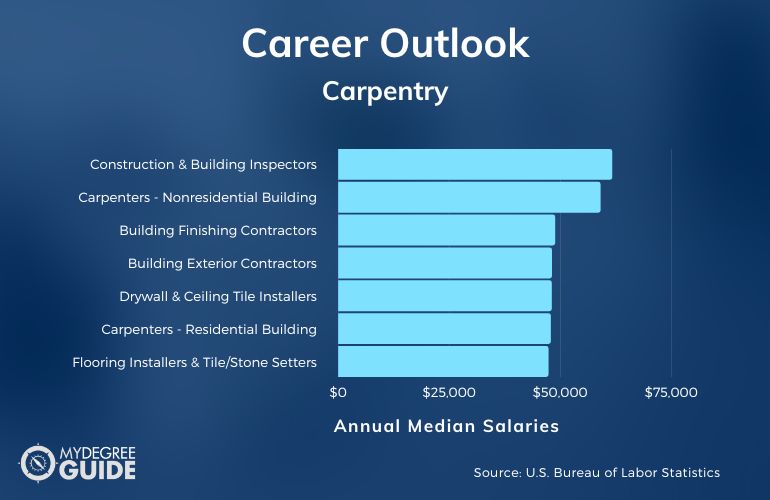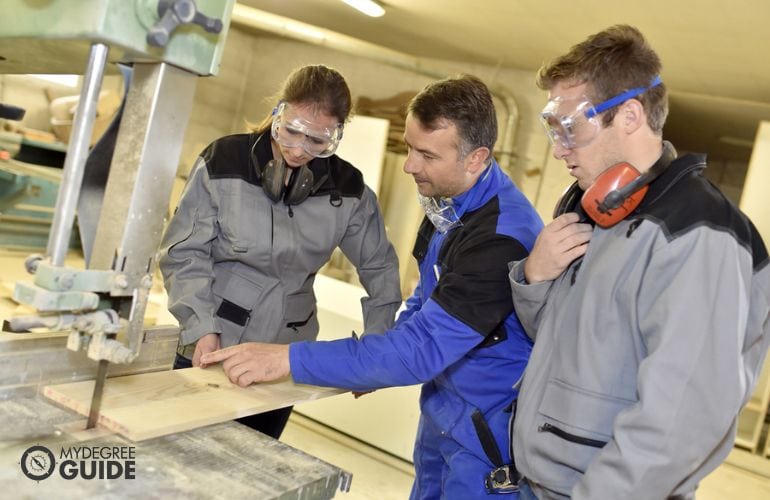A certificate in carpentry is an undergraduate credential you may pursue to gain more knowledge about carpentry practices and techniques.

This certificate program can be beneficial if you wish to enter the workforce or advance from your current position in the carpentry field. An online carpentry program could be a more flexible and convenient pathway to earn your certificate.
Editorial Listing ShortCode:
Construction trade schools online programs could be especially helpful if you want to complete an apprenticeship while earning your certificate or have other responsibilities that could hinder you from attending on-campus classes.
Colleges Offering Online Certificates in Carpentry Programs
Methodology: The following school list is in alphabetical order. To be included, a college or university must be regionally and nationally accredited and offer degree programs online or in a hybrid format.
City College of San Francisco
The City College of San Francisco offers a Carpentry Certificate of Accomplishment program that requires the completion of 13 credits. Graduates may apply to become licensed contractors.
Potential courses include Construction Safety, Introduction to Construction Applications, Blueprint Reading, Carpentry–Rough Framing, and 1 elective. Elective options include Finish Carpentry, Concrete Applications, Carpentry–Advanced Framing, and more.
City College of San Francisco is accredited by the Accrediting Commission for Community and Junior Colleges, Western Association of Schools and Colleges.
Fayetteville Technical Community College
Fayetteville Technical Community College offers a Carpentry Diploma program. Potential courses include Construction Materials and Methods, Estimating, Print Reading, and Sustainable Building and Design. Some classes are available online, and the program may be completed in 3 semesters. The program typically meets the basic educational requirements to apply for a general contractor license in the state of North Carolina.
Fayetteville Technical Community College is accredited by the Southern Association of Colleges and Schools Commission on Colleges.
Midlands Technical College
Midlands Technical College offers a Carpentry Certificate program designed to train skilled workers. Potential courses include Introduction to Building Construction, Fundamentals of Construction Safety, and Blueprint Reading and Specifications. Hands-on training in class and on job sites is offered in the program, which may be completed in 3 semesters.
Midlands Technical College is accredited by the Southern Association of Colleges and Schools Commission on Colleges.
Sheridan College
Sheridan College offers a Carpentry Apprenticeship Certificate of Completion program online. No visits to the campus are usually required. A journeyman’s license may be applied for after completing the program. Sheridan offers open enrollment for all ages and skill levels, and commonly maintains relationships with Habitat for Humanity and the Big Horn Home Builders Association.
Sheridan College is accredited by the Higher Learning Commission.
Online Certificate in Carpentry Programs

Carpentry is a skilled trade that involves building, constructing, and repairing various structures and frameworks. Carpenters may work on commercial, industrial, or residential construction sites and build or remodel properties for various clients.
Pursuing an online diploma in carpentry can introduce you to essential carpentry skills and practices used in the field. Some key topics explored in a carpentry certificate program can include:
- Construction safety fundamentals
- Blueprint reading
- Woodworking
- Building codes
- Proper use of manual and power tools
Technical writing and math courses may be included in the program as well. Writing and mathematical skills are important because carpenters may need to write reports and have a basic understanding of unit conversion, geometry, and trigonometry.
If you’re in high school and interested in becoming a carpenter, you can ask a school counselor for guidance on shop and carpentry courses that your school may offer. An online carpentry school is designed to further your knowledge and skills in the trade. Many carpenters enter the workforce by seeking an apprenticeship to gain on-the-job training.
Online courses are designed to be flexible, which can be more convenient if you’re trying to complete an apprenticeship while earning your certificate.
There are several different types of carpenters and sub-crafts within the carpentry trade, such as:
- Rough carpenter. Rough carpenters specialize in building rough wooden structures, such as scaffolds, bridge supports, or temporary frame shelters.
- Wood flooring installer. Wood flooring installers specialize in installing a variety of wooden floors, such as end-grain and parquet.
- Residential carpenter. Residential carpenters build, install, and repair residential homes and install fixtures and other structures in a dwelling.
- Commercial carpenter. Commercial carpenters specialize in building, installing, and repairing commercial buildings for businesses and other organizations.
- Industrial carpenter. Industrial carpenters work on civil projects, such as bridge, tunnel, and dam construction.
You may also explore professional carpentry certifications if you want to pursue additional credentials outside of an online diploma in carpentry. Industry certifications in carpentry are another way to prove to employers and clients that you have advanced skills and knowledge to take on specific responsibilities.
Carpentry Careers & Salaries

Taking online carpentry classes can introduce you to basic carpentry fundamentals and skills to help prepare you for the workforce.
Daily responsibilities of a carpenter can include constructing and installing building frameworks, structures, and fixtures. They may also read and follow blueprints, ensure buildings are up to code, and inspect for damage and make repairs.
According to the Bureau of Labor Statistics, here are the annual median salaries of jobs in the carpentry field.
| Careers | Annual Median Salaries |
| Construction and Building Inspectors | $61,640 |
| Carpenters — Nonresidential Building Construction | $59,020 |
| Building Finishing Contractors | $48,800 |
| Foundation, Structure, and Building Exterior Contractors | $48,080 |
| Drywall and Ceiling Tile Installers | $48,040 |
| Carpenters —Residential Building Construction | $47,820 |
| Flooring Installers and Tile and Stone Setters | $47,310 |
| Roofers | $47,110 |
| Construction Laborers and Helpers | $37,520 |
| Woodworkers | $36,710 |
Carpenters can specialize in a specific industry, such as commercial, industrial, or residential. The scope of carpentry work can widely vary depending on the industry and level of expertise. Carpentry professionals may also specialize in a specific trade, such as installing drywall, insulation, or flooring.
Job availability and salaries can vary depending on your work experience and where you live. You may seek an apprenticeship as a carpenter or in a related occupation to gain on-the-job experience.
Carpentry Certificate Curriculum & Courses

Online carpentry schools include coursework that can teach you basic carpentry skills and safety procedures. These are some examples of courses that may be offered in a carpenter certificate program:
- Introduction to Building Construction: You’re introduced to the residential and commercial construction trade as well as general construction terms, tools, and safety protocols.
- Fundamentals of Construction Safety: This course reviews construction safety standards and practices.
- Blueprint Reading: In this course, you can learn how to read and interpret construction blueprints and how they depict the finished project.
- Construction Building Code: This course examines building code requirements and the process of inspection as well as how to research and interpret building codes.
- Interior Finishes: Various interior finishing techniques, procedures, and materials are studied, such as types of drywall panels, doors and frames, and floor and ceiling plans.
- Site Layout and Foundations: You’ll learn about the processes and techniques used for laying foundations, including materials used to construct foundations.
- Carpentry Framing: You’re introduced to construction techniques and concepts of framing for various structures, such as floors, walls, and decks. You’ll also learn the proper use of power tools.
- Construction Management: This course reviews the phases of construction projects and teaches students about the management aspects of construction, such as bidding procedures, business methods, project management, and contracts.
- Technical-Professional Writing: You can learn how to write and structure technical reports and documents.
- Basic Technical Math: This is a basic math course that covers algebra, unit conversion, arithmetic, geometry, and trigonometry.
Carpentry certificate courses can give you a broad understanding of carpentry practices, materials, and tools, which can be supplemental to on-the-job training.
Admissions Requirements

Admissions requirements can vary depending on the school offering the program. Some general requirements to be considered for admission to an undergraduate certificate program include:
- High school diploma or GED
- Official high school transcript
- Application form and fee
Most programs request official transcripts to review coursework you’ve completed in high school. The application process typically includes creating an online account with the school and filling out an application with various questions about yourself. Programs may require a fee to submit an application, but some schools have times when application fees are waived.
Carpentry Certificate Programs Accreditation

Colleges, universities, and educational programs can be assessed based on quality standards to receive accreditation.
Accreditation assures students that they’re receiving their certificate or degree from a quality institution, including online construction trade schools. The accreditation status of an institution or program is also important for students to consider because it can affect your eligibility for financial aid and future education and employment opportunities.
You can access a list of accredited postsecondary institutions on the US Department of Education’s website.
Carpentry Licensure and Certifications

Carpenters can seek industry certification or licensure to prove they have advanced carpentry skills and knowledge. Some examples of carpenter certifications include:
- Certified Lead Carpenter (CLC). The National Association of the Remodeling Industry (NARI) offers the CLC credential to recognize experts in leading on-site projects.
- Certified Craftsman. The National Wood Flooring Association (NWFA) offers this credential to recognize lead professionals in the field.
- Certified Remodeler (CR). The NARI offers this credential to recognize expert remodeling professionals.
Although certification and licensure isn’t required, it can show employers and clients that you’re experienced in the trade.
Financial Aid and Scholarships

Financial aid can help you pay for the upfront cost of your education, whether it’s for a certificate or an online degree in construction management. It can come in many different forms, such as state or federal aid, grants, and scholarships.
State and federal financial aid are income-based. Eligibility requirements at the state level can vary, as some states have different application processes than others. You can submit a Free Application for Federal Student Aid (FAFSA) to find out if you’re eligible for federal aid, such as student loans.
Scholarships can be based on income, degree type, academic merit, and more. You can apply for multiple scholarships to potentially increase your chances of receiving a monetary award.
Is Carpentry a Good Career?

Yes, carpentry is a good career for many professionals. Carpenters can develop a variety of hands-on skills through on-the-job training. Career advancement may be possible through additional education or work experience.
One of the potential benefits of carpentry is the wide range of sub-crafts available. Professionals can choose to specialize in a specific type of carpentry that they’re most interested in or skilled in, such as roofing, woodworking, or building inspection.
The median annual salary for carpenters is $48,260, according to the Bureau of Labor Statistics. The lowest 10% earn less than $31,880, while the highest 10% earn more than $80,940.
What Can You Do with a Carpentry Certificate?

A carpenter certificate program is designed to teach you the fundamentals of carpentry and on-site safety procedures. This undergraduate certificate may give you a competitive edge to gain employment.
Some online carpentry schools offer certificates that allow you to specialize in a sub-craft of carpentry, such as residential, framing, or rough carpentry. Earning a certificate may also help you advance quicker in the field. Advancement opportunities can include becoming a first-line supervisor, lead carpenter, or general construction supervisor.
How Long Does It Take to Get a Certificate in Carpentry Online?

Earning a carpentry certificate online may take as little as 4 to 6 months, depending on the program and school. The amount of credit hours required can widely vary depending on the program.
Longer programs may include more in-depth coursework and elective courses than shorter programs. The time it takes to earn your certificate can also depend on whether you’re enrolled in the program as a full-time or part-time student. Apprenticeships, which include on-the-job training, often take additional time.
Is a Certificate in Carpentry Worth It?

Yes, a certificate in carpentry is worth it for many students. Although a certificate isn’t required to become a carpenter, this type of program can educate you on basic carpentry skills and help you obtain the essential knowledge needed to succeed in the field.
According to the Bureau of Labor Statistics, construction and extraction occupations are expected to have a 4% job growth rate over the next ten years. Demand for carpenters and other related careers is expected to grow due to professionals retiring or exiting the field.
Pursuing industry certification in carpentry may be beneficial for professionals who are dedicated to the trade and want to potentially advance in the field.
Getting Your Certificate in Carpentry Online

A certificate in carpentry is designed to educate you on carpentry techniques and safety procedures. It can also introduce you to tools and materials used to build and install various structures and fixtures.
If you’re interested in becoming a carpenter or want to specialize in a sub-craft within the trade, a carpentry certificate program could be beneficial. Although a postsecondary education isn’t required to become a carpenter, it can provide you with additional knowledge that supplements on-the-job training.
You can take the first steps toward receiving your carpentry certificate by researching accredited programs at vocational schools online that align with your interests and career goals.
